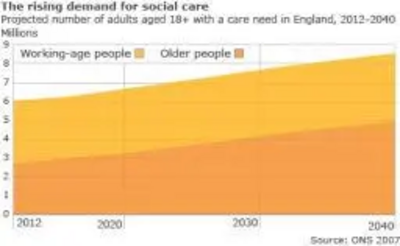Compulsory levy for social care pledged by Labour
A compulsory levy should be introduced to fund a universal social care system for adults in England, Labour says. It said the move would represent the biggest shake-up in the welfare state since the creation of the NHS and end the "cruel lottery" currently in place.
But ministers refused to be drawn on how much and when people should pay, saying a commission would be set up to look at this if they win the election. Such a charge is opposed by the Tories, who have dubbed it a death tax. The subject is now likely to become a key issue during the election campaign.
Funding options
The current system for providing support to the elderly and people with disabilities is means-tested.

So if Labour's plan for a National Care Service were introduced - and this would not happen until after the lifetime of the next parliament - it will be the first time everybody has been entitled to state support for a residential care place or home help. The intervention comes after councils have been struggling to cope with rising demand, mainly fuelled by the ageing population.
WHERE THE PARTIES STAND
Labour - Put forward three proposals last summer and after public consultation has now backed a compulsory levy, although commission to be set up to decide how much and exactly when people should pay
Tories - Proposed an £8,000 voluntary insurance model to cover residential care costs. Now drawing up plans for a voluntary scheme to cover domestic care, such as help washing, eating and dressing in the home
Lib Dems - Initially supportive of free personal care - like Scotland has introduced - but now want a "partnership" whereby state pays some and individual tops this up. Open to compulsory levy
The result is that many vulnerable people living at home have been left to fend for themselves or rely on the help of family and friends for assistance with washing, eating and dressing. Thousands of people have also been forced to sell family homes to pay for residential care.
The government put forward three funding options for a new system last summer. They all involved the state providing a basic level of funding, which could be topped up by personal contributions, an insurance scheme or a compulsory fee.
Unlike Tuesday's announcement, the policy paper last summer went as far as to suggest a compulsory charge could be up to £20,000 per person. This incited the Tory accusations of a death tax, as one of the ways it could be paid was from a person's estate once they had died. The government consulted widely on the proposals, with many charities and social care chiefs backing a compulsory charge as the best way to raise the money needed to sustain the system.
But cross-party talks in recent months failed to reach a consensus. The Conservatives are adamant people should not be compelled to pay and refused to back a compulsory levy in talks held in recent months. Instead, they back a voluntary insurance scheme.
However, Health Secretary Andy Burnham said making everyone pay - apart from the very poorest - was the only fair way to create a fair system as he unveiled a white paper on the issue. He announced an independent group of experts would be appointed to look at exactly how such a fee could be applied. This will look at a range of methods, including allowing people to defer their pensions, paying it up front or taking it from their estate after death. Mr Burnham hailed the policy as a "momentous decision".
Pensioner Audrey Burgin: "People say I could go on a world cruise for the money I spend on care"
He added: "It will give people peace of mind in later life and help them protect everything they have worked for. We have the cruellest system of all at the moment."
As an interim measure, the government has already said it will provide free care in their own homes to people with the most severe needs. People who have been in care homes for more than two years will get their care for free from 2014 as part of a phased introduction of the new system. Campaigners welcomed the move, saying it would benefit the most vulnerable people in society.
Stephen Burke, chief executive of Counsel and Care, the charity for older people, added: "Free care for all is a historic commitment and signals a new frontier to the welfare state."
But shadow health secretary Andrew Lansley accused ministers of still wanting a death tax but just delaying the decision for a few years. He said charging everyone for social care was "unfair on the people who meet their caring responsibilities", such as families caring for elderly relatives at home.
Norman Lamb, the Liberal Democrats' health spokesman, said he wanted to get the three main parties to work together on the issue after the election. "Seeking consensus is the right approach but that will only work if the cross-party commission is free to consider all ways of funding social care, not just Labour's preferred policy."
Councillor David Rogers, of the Local Government Association, said: "We need a new system and that will inevitably be a combination of tax revenue and individual contributions in some form. The next government must sort this out."
"The next government must sort this out."